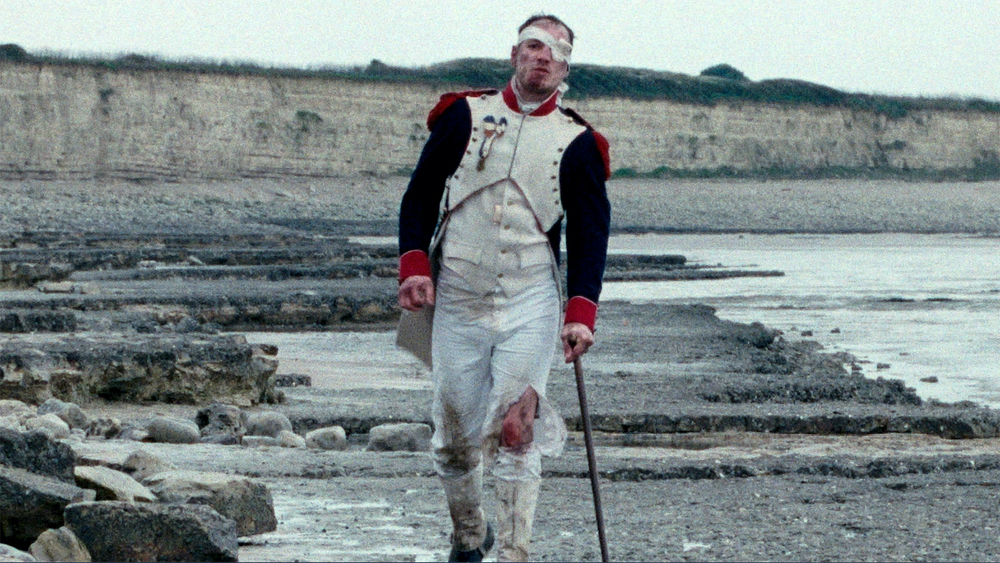‘The Glorious Acceptance of Nicolas Chauvin’: Nationalism Wrapped in Charisma
By Jamie Lang
LOS ANGELES (Variety.com) – Winner of Locarno’s Signs of Life section, Benjamin Crotty’s “The Glorious Acceptance of Nicolas Chauvin” has enjoyed more than 12 months of festival success and critical acclaim as it reaches the end of its festival run at ’s MyFrenchFilmFestival.
A modern take on one of France’s most influential yet widely unknown characters, the film headlines Nicolas Chauvin, a farmer-turned-soldier in Napoleon’s First Army of the French Republic. Although some sources claim the 17-times injured in defense of France Chauvin was a real person, it’s now commonly accepted that he was an invention meant to represent nationalistic values prominent among soldiers at the time. Today he is best recognized as the namesake of chauvinism, and seen as a cautionary character regarding the dangers of nationalism, sexism, racism and other extreme points of view.
In just over a decade of filmmaking, Crotty has twice been awarded at Locarno and featured at other major international festivals with his work. He talked with Variety ahead of MFFF about producing shorts in France, shooting on film, literary inspiration and finding a leading man capable of eliciting sympathy while playing such a caustic character.
Can you talk a bit about the production side of the film? How did you finance it?
The film was produced by Les Films du Bal, with whom I made the low-budget feature “Fort Buchanan” in 2014, and was financed from a bunch of sources, including CNC, regional funding from Nouvelle-Aquitaine (where we shot most of the film and where Nicolas Chauvin was allegedly born), a Bordeaux TV station, and a contemporary art grant from DRAC Ile-de-France.
How influential was source material in your screenplay? What kind of research did you do into the supposed myth of Chauvin?
Source material was extremely important to me here. I came to know of Nicolas Chauvin through a short piece by Joshua Cohen that I still vividly remember reading. I was alone in a park in Paris and I started laughing out loud. It’s a pretty outrageous piece of writing. That is where the initial idea for the film came from – the actual “Academy Awards” style acceptance speech onstage – and Joshua kindly allowed me to adapt and expand on his idea, although his text is quite short though, maybe six or seven pages.
So then I read a fascinating book by Gérard du Puymège about Chauvin, the soldier-laborer, which is a scholarly work, highly detailed and documented and gave me a lot more information about the birth of the legend, and Chauvin’s many and varied appearances on the Vaudeville stage and in literary and visual art works throughout the 19th century, and of course, most importantly, the fact that he was likely invented and never a real person.
It was from a 19th century engraving of a Napoleonic era farmer-veteran, who comes upon a skeleton of a soldier, while plowing his fields once back from the wars (apparently this was a motif in engraving and paintings at the time, which seems like a PTSD thing), that I got the idea for the zombie crusader soldier character they find in the field.
So much of the film’s impact is dependent on Alexis’ delivery. How was it working with him just as his star is rising?
Alexis is an actor who is looking for challenges and wants to push his limits. He has a great combination of a solid work ethic – which was important since this was a demanding role textually and we were shooting on film with pretty long takes – while still being modern and spontaneous in his performance and delivery. We shot before “Les Miserables,” so his career has really blown up since, but I’m not surprised, and I hope it continues to do so.
Does it say more about me as a white man or you as a writer that I empathized with Nicolas when watching this film, even cheering him on at times?
The representation of him in the film is pretty close to how he was represented historically. He was a laughable character, especially for a savvier urban audience. In some respects, the film re-enacts this quite simply. It is a bit like a comic relief character suddenly getting center stage.
I complicated him a tad-bit, though, incorporating elements of more of a “bro” or more of a dandy at certain moments. There is, for example, a passage inspired by a decadent novel by Octave Mirbeau, and this is a nod to later forms of Frenchness and masculinity and also because I feared it would be too boring and possibly unbearable if he were too much the same for 26 minutes.
What are you working on now? Any plans for a feature in the future?
I recently finished writing an adaptation of a different Joshua Cohen short story, a project I had before “Chauvin,” with Géraldine de Margerie. It’s a contemporary comedy. Currently I’m a resident at the Villa Medici in Rome where I am working on another new script about reality TV in France in the early 2000s. Both are features. So, we shall see.

